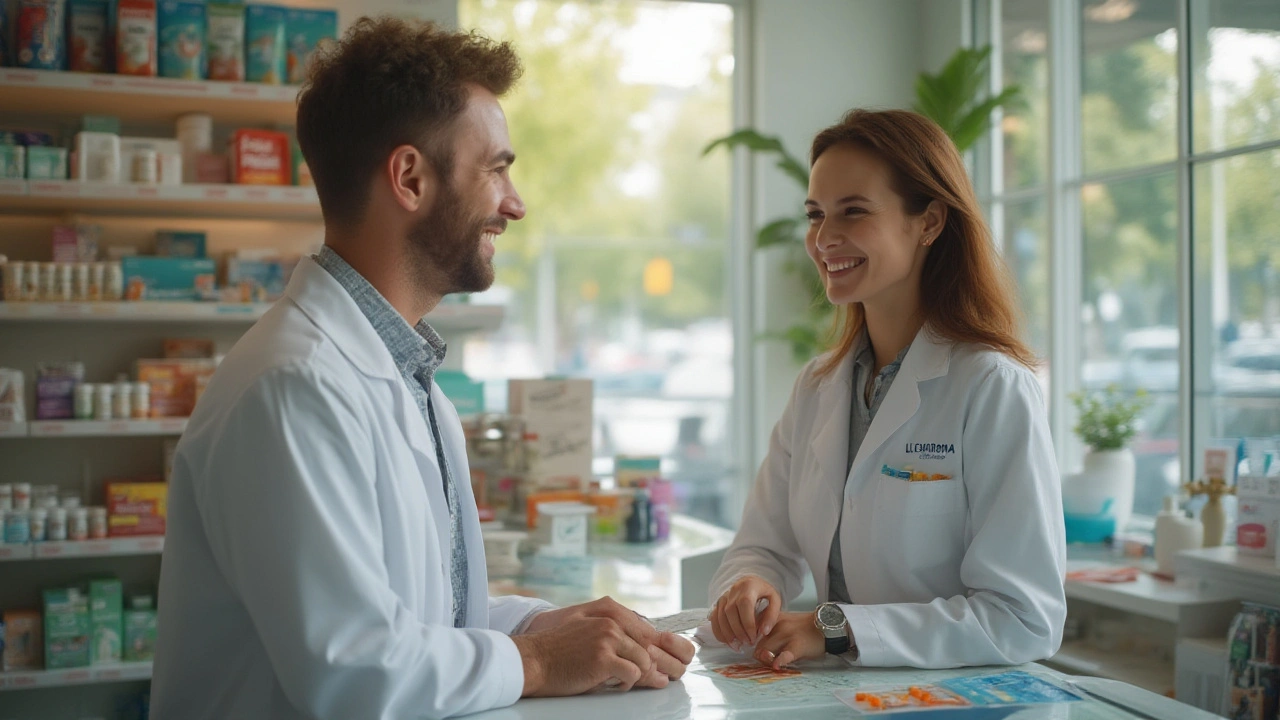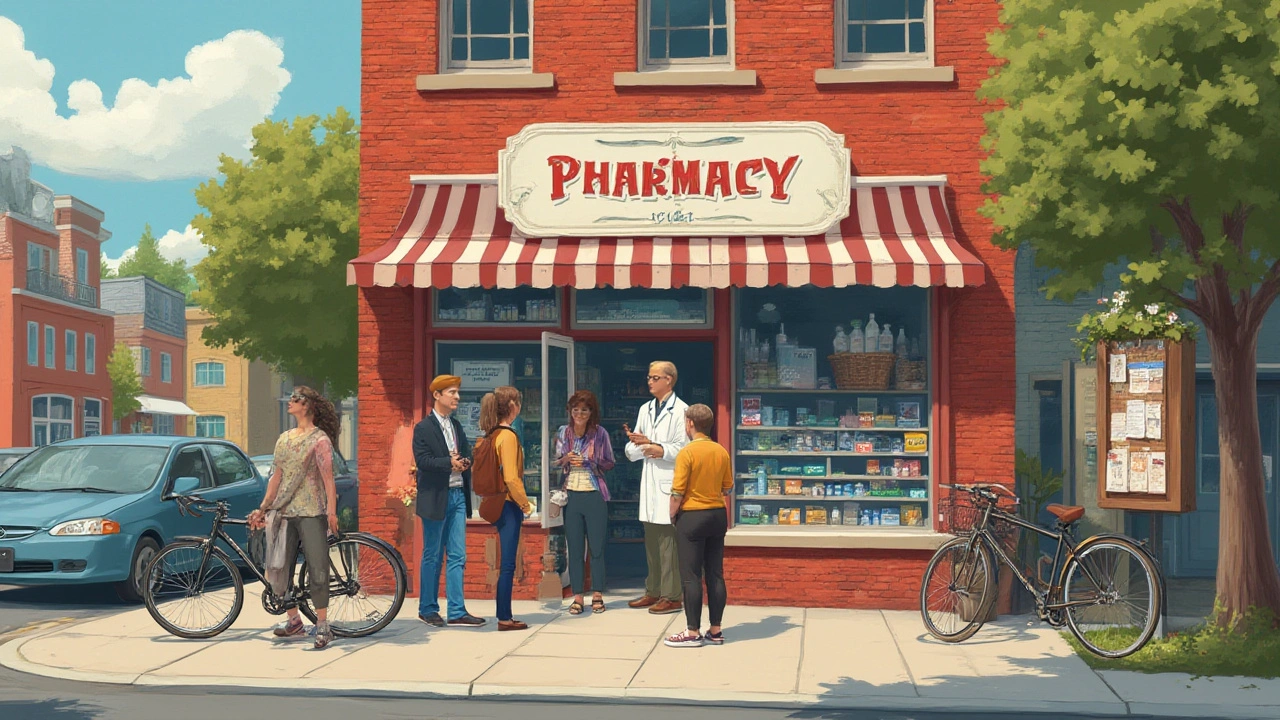How to Build Trust With Your Local Pharmacist: Tips for Connection and Better Health

Imagine for a second: you head to the pharmacy. Your kid's prescription needs filling, but part of you wonders if the pharmacist genuinely knows your concerns or if you're just the next faceless customer. Sound familiar? Most of us don’t realize what a personal asset a trustworthy local pharmacist can be. They’re not just counting pills—they’re catching errors, giving advice, and noticing patterns. It can make a world of difference, especially for families or anyone juggling complex health issues. But how do you move from small talk to a real sense of trust? Here’s the honest guide.
Why Your Pharmacist Matters More Than You Think
When people talk healthcare, they often think doctors, nurses, maybe dentists—and that’s where the conversation ends. But pharmacists fill a huge gap. In 2023, the American Pharmacists Association reported more than 4.1 billion prescriptions were dispensed in the U.S. That’s a lot of room for mistakes and a lot of opportunities for guidance. The Centers for Disease Control and Prevention (CDC) says that medication errors lead to over 1.3 million injuries each year nationwide. Who’s best positioned to catch even a small fraction of those before they reach your medicine cabinet? That’s right, the local pharmacist down the street.
What most people overlook is that your pharmacist isn’t just slapping labels on bottles. With today’s automated insurance rejections, ever-changing formularies, and frantic doctors’ offices, pharmacists spend more time than ever sorting out problems no one else catches. If you have kids, you know allergy season means complicated over-the-counter choices. If you’re managing allergies, blood pressure, or diabetes, the pharmacist is often the person who spots potential clashes faster than any nurse or doctor. According to a 2024 Consumer Reports survey, 68% of people rarely or never talk to their pharmacist. Yet those who did were more likely to avoid medication errors, discover lower-cost alternatives, and feel supported when changing meds.
Cracking the Code: How Pharmacists Gain Trust
The big trust breakthrough happens when you realize pharmacists are both highly trained and expected to keep your health secrets—by law. Pharmacists must complete at least six years of college, pass rigorous licensing exams, and participate in annual continuing education. On top of that, HIPAA privacy regulations require them to protect every detail, from what you pick up to what you whisper over the counter. That makes the pharmacy counter one of the safest places to talk about your concerns or even your family’s awkward problems.
Pharmacists don’t just know prescriptions—they track over-the-counter medications, vitamins, supplements, and sometimes see all your health info in one place before even your doctor does. Ever wondered why you can’t just grab ‘Sudafed’ off any shelf? That’s because of legal controls and expert gatekeeping. Most community pharmacists know which allergy or cough medicine is safest with your kids’ existing medications or your own, even if the doctor’s note is vague. Build a relationship and they’ll flag issues when refills run low, insurance rejects a claim, or your dosage changes seem odd. Studies show that trusted pharmacist relationships help boost medication adherence—a Harvard study in 2023 linked pharmacist counseling to a 9% increase in patients taking meds as prescribed. That translates directly to better outcomes and fewer emergency room visits.

How to Start Building Real Trust
The first step is simpler than you’d think: consistency. Use the same pharmacy, even if you sometimes order online in a pinch. The more often you or your family show up, the more the pharmacy team becomes familiar with your medical story. Next, introduce yourself. It feels awkward, yes, but remembering your name and even one detail—a kid’s allergy, your pet peeve about pill size—gives the pharmacist a starting point.
Don’t be shy about asking questions. Pharmacists expect them. Here are a few to consider:
- Is this generic medication bioequivalent to the brand?
- Are there any safety tips I should know—like food or drink to avoid?
- What should I do if I miss a dose or have a weird side effect?
- Can you explain insurance coverage or suggest lower-cost options?
- Is there a more kid-friendly form (liquid, chewable, dissolvable)?
If talking at the counter feels rushed, ask for a consult—they sometimes have private spaces or can recommend a good time to chat. Bringing your meds in a pillbox or list, or tracking doses on your phone, makes their job easier. They’re busy, but trust me, they notice when someone is proactive. This can kickstart real partnership, like when my son Dashiell had an antibiotic allergy scare; our local pharmacist had flagged it in the system even before our pediatrician called back.
What to Watch For: Red Flags and Green Lights
A great pharmacist is patient and thorough—their best skill is listening, not just talking. But not all experiences are equal. How do you spot the difference?
- Does the pharmacist greet you, or at least make eye contact? Even at busy chain stores, the best ones try to connect.
- If you ask a question, do they pause to give a real answer, or do they just brush it off?
- Are they willing to call your doctor to clarify a prescription or suggest alternatives if there’s a supply issue?
- When a medication is out, do they explain when to expect it—offering realistic, concrete answers?
- Do they keep private health stuff private, or do you feel like people nearby can overhear everything?
If you ever feel dismissed, it’s fair to say, “Can we talk in private?” If mistakes happen, see if the pharmacy corrects them quickly, honestly, with a clear explanation. Good pharmacies have error protocols and should chart the same thing in their record system. Here’s a comparison table showing what to look for:
| Positive Pharmacy Experience | Negative Pharmacy Experience |
|---|---|
| Personalized greeting, remembers preferences, thorough safety checks | Rushed, impersonal, avoids questions |
| Confidential consults, offers advice, clarifies insurance or doctors’ orders | Loosely managed counter, privacy concerns |
| Flags interactions, gives reminders for refills, tracks allergies proactively | Misses refill changes, ignores prescription conflicts |
| Admits errors, explains next steps honestly | Defensive, evasive if something goes wrong |

Staying Engaged for Your Long-Term Health
Once you’ve got the conversation going, maintenance is key. Don’t treat pharmacy visits like a chore to rush through. If you get a new diagnosis or med, loop the pharmacist in—even before picking up your script. They can check things like food interactions, whether the new meds mesh with old ones, or if there’s a cheaper or easier-to-take version. After hours? Most pharmacy chains now let you message or refill through apps. That digital trail helps your pharmacist stay prepared, and it lets you catch little issues early.
Pharmacists can also be a resource beyond the basics. Seasonal vaccines? Travel advice on malaria pills or altitude sickness? Special equipment for chronic health needs? They’re a bridge between you and your complicated health insurance. A 2024 CDC report showed that people who visited a familiar pharmacy were 24% more likely to stick to vaccine schedules versus those jumping pharmacies. The result: fewer gaps in care, fewer headaches, and a healthier family all around. If you’re moving or switching, ask your current pharmacist for printouts of your meds and allergy lists to ensure a smooth transition.
Trust isn’t magic—it comes from a mix of small, everyday actions and mutual respect. Your local pharmacy is more than a pit stop. With habits, questions, and little check-ins, you turn the counter into a real health ally. No need for secrets—just a bit of old-fashioned connection. That’s the part that keeps your family safer, year after year.
Honestly, building trust with your local pharmacist feels like a no-brainer but people often overlook it. When you actually chat with them, ask questions, and show that you value their expertise, it’s amazing how much better the whole medication experience can be.
It’s way more than just grabbing pills; it’s about having a professional who can alert you to drug interactions, side effects, or cheaper alternatives. Plus, if your pharmacist knows you, they can personalize advice, which is a huge win for overall health.
What’s everybody’s go-to move for breaking the ice with their local pharmacist? I usually start with a simple “how’s your day going?” — sounds dumb but it works.
And yeah, I've found those relationships are especially clutch when you’ve got ongoing conditions and multiple prescriptions cluttering your life.
Oh wow, honestly I used to be one of those people who just saw the pharmacist as a mere pill dispenser, but a little effort and bam! You realize how much they actually care and understand about your unique health context. 💊🤓
As an interaction junkie, I think the key is to bring a little lightheartedness, like sharing funny anecdotes or just sprinkling in some emoji-heavy chats. 😜 It breaks down the cold, sterile vibe and opens the door for connection.
Plus, pharmacists get major game for juggling science and customer service - it's seriously underrated. You can learn a ton just by shooting the breeze with them about meds and wellness trends.
I find it tricky sometimes to know how deep to get into conversations with my pharmacist without feeling like I’m invading their space. Anyone else ever feel that way?
But on the other hand, it’s clear that building rapport is important for your own health outcomes. Knowing you have someone who really understands both the medical and personal sides of your situation can be crucial.
Maybe just starting with simple questions about medication side effects or usage tips can lead to a more natural ongoing relationship.
Does anyone have tips for keeping these interactions casual but meaningful? Would love some input!
Building trust starts with active listening, right? When we take the time to truly hear our pharmacist’s advice and concerns, it sets the stage for honest and open communication.
Also, pharmacists are people — really cool, knowledgeable people! They often have personal insights about health that even doctors might miss, given how hands-on they are with medications daily.
Let’s not forget, empathy goes both ways. A little kindness, patience, and respect can create a safe space for questions and health discussions that benefit everyone involved.
Really appreciate this post for shining a light on a frequently overlooked alliance in our healthcare journeys.
Sure, trust with pharmacists might seem like a quaint idea until you consider the shadowy pharmacological-industrial complex that controls medication distribution. You really want to think twice before building rapport with someone who's essentially a cog in the machine profiting off your health woes.
That said, I don’t deny that having a knowledgeable point of contact for meds is useful. Just don’t be fooled into thinking they're impartial; there’s always profit-driven agendas tangled up in the mix.
This is why transparency and aggressive questioning of every recommendation is essential — don’t just trust, verify.
What do others do to stay street-smart while still trying to have a connection?
Of course, the idea of "building trust" with a pharmacist comes loaded with all sorts of unexamined power dynamics and cultural assumptions. Are we really 'connecting', or just submitting to one more point of biopolitical control?
Still, I get it — in practicality, having a reliable source for health info helps. But don't mistake small talk and smiles for genuine empowerment or holistic care.
I’m not saying don’t talk to your pharmacist, just... keep your critical thinking cap on at all times. 🤷♀️
Anyone else feel like these interactions are more transactional than truly relational?
Namaste from India! While I’m far from a pharmacist myself, I’ve always recognized how pivotal their role can be in local healthcare networks. They are trustworthy pillars when doctors aren’t immediately accessible.
One thing we do here is make sure to ask about alternatives and generic versions — pharmacists often know cost-effective options better than physicians, which is a huge help for many patients.
Something I’m curious about, especially for folks in the US: how open do pharmacists tend to be about discussing medication side effects? I find that communication styles differ drastically.
Hope to see more people fostering that important connection. It’s wise health diplomacy 🌿.
While I appreciate the spirit of this post, it’s imperative that trust is built on professionalism and factual knowledge rather than just friendly chats. Trust should not mean lowering your guard.
Pharmacists must adhere to strict regulatory standards, and patients should verify dosages, potential interactions, and proper use vigilantly. Ignorance isn’t bliss in healthcare.
That said, encouraging rapport can lead to more thorough discussions and better patient compliance. It is a balance that must be struck carefully.
Does anyone have examples where a pharmacist relationship either saved them from medication errors or helped avoid adverse reactions?
I must say, the idea of using informal language or emojis when communicating important health matters with pharmacists makes me a bit wary. Precision and clarity are crucial.
That said, building any form of trust is valuable, but it cannot come at the expense of accuracy and professionalism. Too many people treat medication like casual banter, and it leads to errors.
I'd advocate for clear, straightforward communication, supported by thorough questioning if needed, rather than relying on warming up with jokes or slang.
How do others keep conversations respectful and factual without falling into overly casual territory?
Ah, the deceptively simple act of "building trust" with one's local pharmacist, veiled within an aura of innocent human interaction, yet shadowed by the covert machinations of the pharmaceutical hegemony. Trust is no mere casual dalliance but a treacherous terrain rife with jargon-laden discourse and subtle power plays.
One must be ever vigilant, for behind the friendly smiles may lurk the insidious agenda of profit-driven narratives camouflaged in the lexicon of health. Yet, acknowledging this, the pragmatic approach demands the discerning patient engage with the pharmacist, wielding lexemes of inquiry to unmask the underlying complexities.
In sum, trust, if built, must be scaffolded upon a labyrinth of epistemic caution and linguistic precision to navigate the semantic deluge that pharmaceutics unleash.